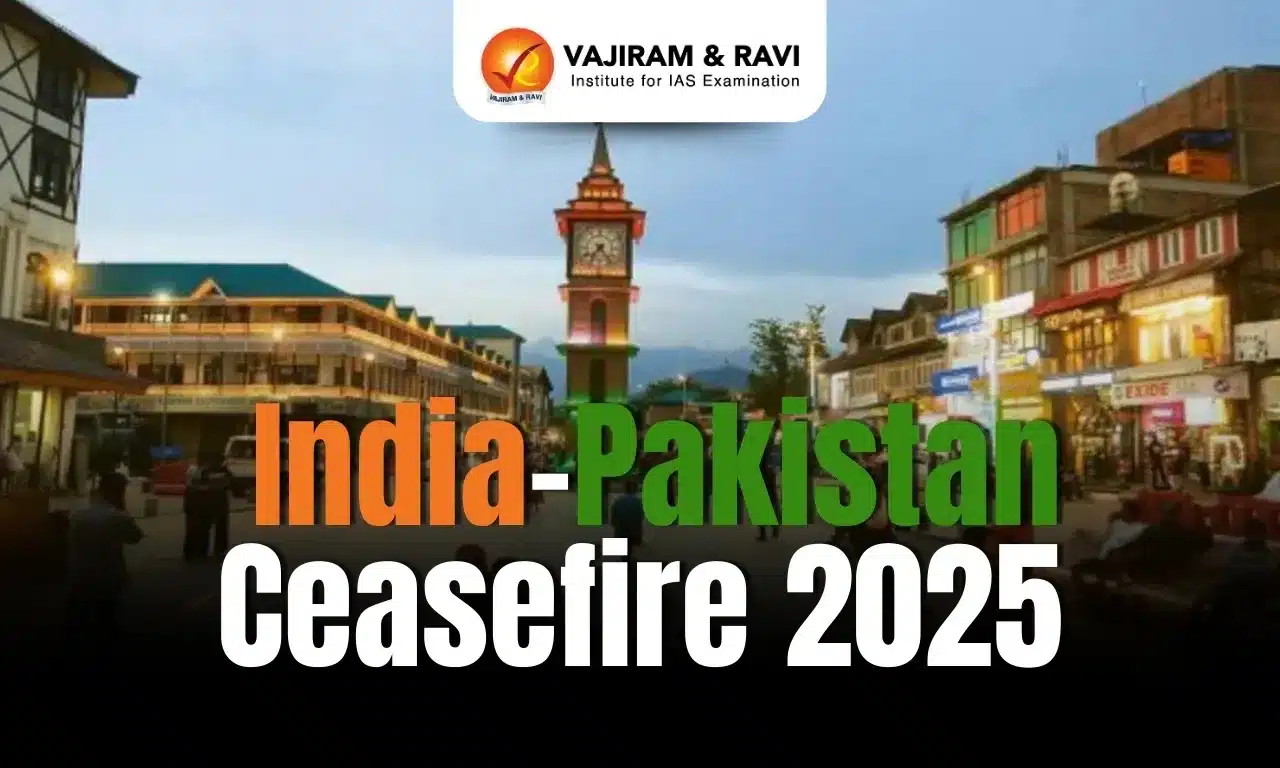What’s in Today’s Article?
- India-Pakistan Ceasefire 2025 Latest News
- India and Pakistan Agree to Cease Military Action
- End of the Most Intense India-Pakistan Conflict in Decades
- India-Pakistan Ceasefire 2025 FAQs
India-Pakistan Ceasefire 2025 Latest News
- Eighteen days after a terror attack in Pahalgam, J&K, triggered an Indian military strike and four days of intense conflict with Pakistan, both nuclear-armed nations agreed to cease hostilities and halt military action from 5 pm on May 10.
India and Pakistan Agree to Cease Military Action
- After three days of intense hostilities, India and Pakistan reached an “understanding” to stop all military action and firing.
- The announcement was made by External Affairs Minister S. Jaishankar on May 10, 2025.
Ceasefire Bilaterally Agreed, Punitive Measures Unaffected
- Official sources emphasized that the decision was a bilateral agreement, not mediated by any third party.
- India clarified that the ceasefire would not impact the punitive actions taken in response to the April 22 Pahalgam terror attack.
Role of the United States
- US President Donald Trump claimed credit for brokering the ceasefire after overnight negotiations.
- Secretary of State Marco Rubio and Vice President JD Vance engaged with senior Indian and Pakistani leaders.
- Rubio said both nations agreed to begin broader talks at a neutral venue, a claim India later refuted.
- Despite US claims, Indian officials emphasized that the ceasefire was a bilateral understanding with no foreign mediation, consistent with the 1972 Simla Agreement.
End of the Most Intense India-Pakistan Conflict in Decades
- The recent India-Pakistan military confrontation, the most intense in 20 years, has concluded.
- However, the nature of engagement between the two countries has shifted significantly.
India Redefines Terms of Engagement
- Since 2014, India has moved to dismantle the framework that allowed Pakistan to exploit nuclear deterrence and cross-border terrorism.
- Key steps include:
- Crossing the LoC post-Uri (2016)
- Striking deep into Pakistan during Balakot (2019)
- Revoking J&K’s special status
- Attacking terror camps in West Punjab (2025)
- Suspending the Indus Waters Treaty
Delhi Signals No More Restraint
- The suspension of the Indus Waters Treaty and deep strikes inside Pakistan mark a new posture: India is prepared to hit core areas if provoked by terror.
- Talks, if they occur, will likely include demands to renegotiate the Indus treaty and revise the engagement framework set during India’s weaker 1990s phase.
Third-Party Mediation Diminished but Still Present
- Although U.S. initially adopted a hands-off approach, it re-engaged as hostilities escalated.
- U.S. National Security Adviser Marco Rubio facilitated calls between Delhi and Rawalpindi.
- Still, India and Pakistan demonstrated the ability to manage escalation directly — a shift from the heavily mediated past.
History of Missed Diplomatic Opportunities
- Past ceasefires and backchannel negotiations (e.g., 2004–2007, 2021) have failed due to political instability in Pakistan and internal military-civilian rifts.
- The rise of Gen. Asim Munir in 2022 hardened Pakistan’s stance and derailed earlier initiatives.
Need for Defence Reform and Strategic Military Edge
- India’s broader national power has increased, but military superiority over Pakistan remains limited.
- Achieving operational dominance is crucial for treating terrorism as an “act of war” and deterring future provocations.
Engagement Beyond the Pakistan Army
- India may need to build links with Pakistani civil society and political elements to reduce military dominance and promote peace.
- Large conflicts often cause internal shifts in Pakistan — whether this latest one weakens or strengthens Gen. Munir’s grip is still unclear.
A Wake-Up Call for Both Nations
- For the first time in years, Indian cities experienced the consequences of modern warfare, including drone strikes and long-range attacks.
- The trauma of urban warfare could prompt reflection on the long-troubled state of India-Pakistan relations, even after 75+ years of independence.
India-Pakistan Ceasefire 2025 FAQs
Q1. Why did India and Pakistan agree to a ceasefire?
Ans. To stop hostilities after the Pahalgam terror attack and ensuing intense military engagement across borders.
Q2. Was the ceasefire mediated by a third party?
Ans. No. India emphasized it was a bilateral decision, contrary to U.S. claims of brokering the agreement.
Q3. How has India’s military stance changed?
Ans. India has shifted toward deep strikes and reduced restraint, aiming to deter terror by redefining engagement rules.
Q4. What is the role of the Indus Waters Treaty now?
Ans. India suspended it, signaling a tougher stance that includes water as leverage in future negotiations.
Q5. What reforms does India seek post-conflict?
Ans. India aims to build strategic military superiority and engage beyond Pakistan’s military to influence civil society.
Last updated on November, 2025
→ Check out the latest UPSC Syllabus 2026 here.
→ Join Vajiram & Ravi’s Interview Guidance Programme for expert help to crack your final UPSC stage.
→ UPSC Mains Result 2025 is now out.
→ UPSC Notification 2026 is scheduled to be released on January 14, 2026.
→ UPSC Calendar 2026 is released on 15th May, 2025.
→ The UPSC Vacancy 2025 were released 1129, out of which 979 were for UPSC CSE and remaining 150 are for UPSC IFoS.
→ UPSC Prelims 2026 will be conducted on 24th May, 2026 & UPSC Mains 2026 will be conducted on 21st August 2026.
→ The UPSC Selection Process is of 3 stages-Prelims, Mains and Interview.
→ UPSC Result 2024 is released with latest UPSC Marksheet 2024. Check Now!
→ UPSC Prelims Result 2025 is out now for the CSE held on 25 May 2025.
→ UPSC Toppers List 2024 is released now. Shakti Dubey is UPSC AIR 1 2024 Topper.
→ UPSC Prelims Question Paper 2025 and Unofficial Prelims Answer Key 2025 are available now.
→ UPSC Mains Question Paper 2025 is out for Essay, GS 1, 2, 3 & GS 4.
→ UPSC Mains Indian Language Question Paper 2025 is now out.
→ UPSC Mains Optional Question Paper 2025 is now out.
→ Also check Best IAS Coaching in Delhi


















